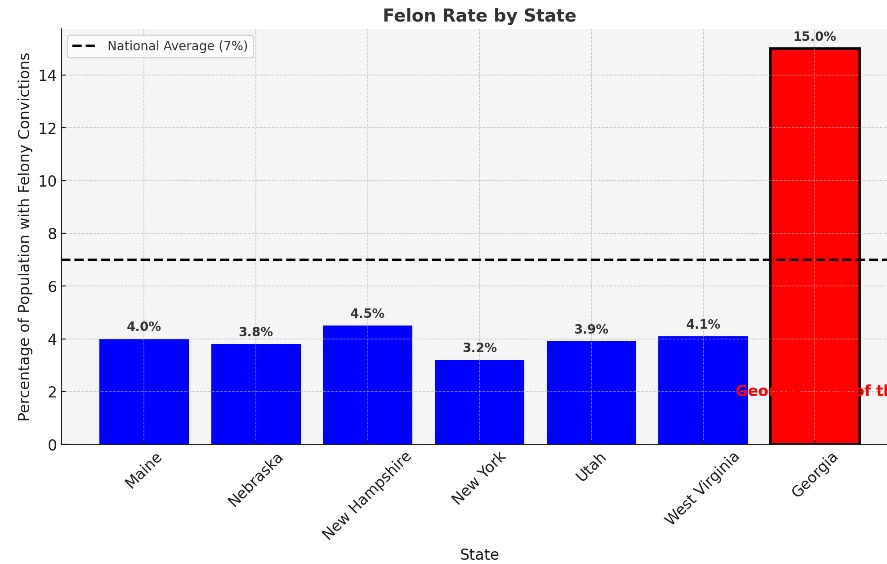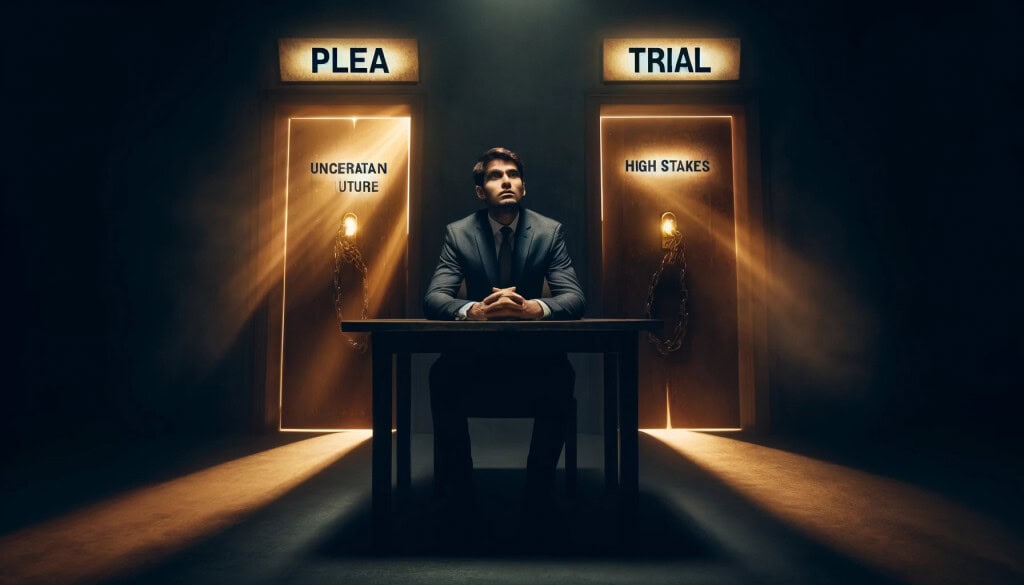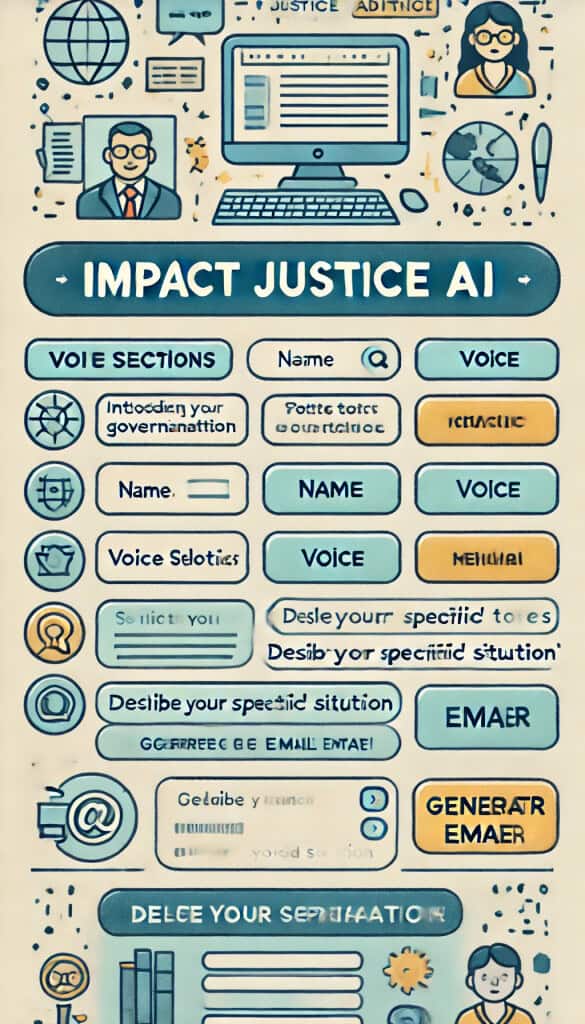1 out of every 7 adults in Georgia are convicted felons. With the highest felony conviction rate in the nation, this isn’t just a statistic—it’s a warning sign. Something is terribly wrong with Georgia’s justice system.
Imagine being accused of a crime you didn’t commit. You’re arrested, handcuffed, and taken to jail. There’s no physical evidence, no eyewitnesses, just an accusation. The prosecutor offers you a deal: plead guilty, and you’ll get five years on probation. Go to trial, and if you lose, you’re looking at 20 years in prison. You didn’t do it, but the stakes are too high. You sign the deal, you are now a felon, admitting to a crime you didn’t commit, because the system isn’t built for the innocent—it’s built to convict.
For over 200 years, the American justice system was guided by a foundational principle: “It is better that 100 guilty persons escape than that one innocent suffer.” Known as Blackstone’s ratio, this idea shaped the nation’s commitment to protecting the innocent, ensuring fairness, and prioritizing justice over mere convictions. Yet in Georgia, this principle has been abandoned. The focus is no longer on safeguarding the innocent but on securing as many convictions as possible—regardless of guilt or fairness.
This is the reality for countless people in Georgia, where the justice system is designed to prioritize convictions over truth and punishment over fairness. With one of the highest incarceration rates in the nation, Georgia’s prisons are overcrowded, its probation rolls are bloated, and its justice system disproportionately targets the poor, the underrepresented, and, often, the innocent.
Nationally, studies suggest that 6% of incarcerated individuals are innocent. In Georgia, for reasons we will show, that number could be as high as 10-12%. That means thousands of people—your neighbors, your family members, your friends—are sitting behind bars, their lives destroyed, simply because the system failed them.
This article explores the systemic flaws in Georgia’s justice system that lead to these injustices: coercive plea deals, evidentiary rules stacked against defendants, and a relentless focus on punishment. By understanding how these failures occur, we can begin to push for reforms that restore fairness, protect the innocent, and rebuild trust in the system.
Because if it could happen to them, it could happen to you.

Georgia’s Overwhelming Conviction Rates
Georgia’s justice system is unparalleled in its ability to convict. With nearly 90,0001 people incarcerated in state prisons and county jails, and an additional 420,0002 under probation or parole, the state leads the nation in correctional control. Shockingly, 15% of Georgia’s adult population—approximately 1 in 7–has a felony conviction3, the highest rate in the country by far, more than double the national average. Most certainly the highest rate in the world.

These staggering numbers raise an important question:
Does Georgia truly have more criminals than anywhere else, or is its justice system fundamentally broken?
The sheer scale of Georgia’s justice system is unmatched in most other states, creating a ripple effect that devastates families, burdens communities, and drains public resources.
Why So Many Felons?
Georgia’s justice system produces more felons than any other state—not because crime is higher, but because the system is designed to convict as many people as possible. Aggressive prosecution tactics, such as overcharging, stacking charges, and broad criminal statutes, allow prosecutors to turn minor infractions into life-altering felonies. Laws like Party to a Crime and the Felony Murder Rule mean people can be convicted without ever committing an actual crime. Meanwhile, vague legal standards, such as Georgia’s “should have known” clause in Theft by Receiving cases, make it easier to convict people based on assumptions rather than proof.
Once accused, defendants face an uphill battle, as the system favors plea deals over fair trials and imposes mandatory minimums that strip judges of discretion. The result? A felony conviction rate higher than any other state in the nation.
Innocent People Are Particularly Vulnerable
Georgia’s justice system doesn’t just convict the guilty—it ensnares the innocent. Using national studies estimating that 6% of prisoners are innocent4, at least 3,000 people in Georgia’s prisons may have been wrongfully convicted. Given that Georgia’s conviction rate is more than double the national average, some believe this number could be closer to 6,000, underscoring the urgent need for systemic reform. And the problem doesn’t end there—how many innocent people are on probation, parole, or have already completed their sentences under the weight of a wrongful conviction?
Georgia’s legal system creates this environment through systemic flaws such as coercive plea deals, unfair evidentiary rules, and procedural barriers. These practices force even those who are wrongfully accused to plead guilty, fearing the risks of harsh mandatory sentences or the nearly impossible odds of winning at trial.
The Consequences of a Broken System
The fallout from Georgia’s high conviction rates extends far beyond the prisons themselves:
- Overcrowded Prisons: Harsh sentencing and mass supervision swell prison populations, leading to increased violence and neglect. Inmates and correctional officers alike are trapped in unsafe conditions.
- Broken Families: Felony convictions tear families apart. Children grow up without parents, and entire communities lose vital members who could otherwise contribute to society.
- Eroded Public Trust: When innocent people are convicted and fairness is absent, the justice system becomes a conveyor belt for punishment rather than a safeguard for truth and accountability.
Georgia’s justice system isn’t just broken—it perpetuates cycles of harm that affect everyone, from those wrongfully accused to the families and communities left behind. Reform is no longer optional; it is essential to restore fairness, rebuild public trust, and break this destructive cycle.
In Georgia, innocent individuals often plead guilty, not because they committed a crime, but because the risks of going to trial are too high.

The Coercive Power of Plea Bargains
In Georgia, the overwhelming majority of convictions—approximately 95%—result from plea deals, not trials. For many defendants, the choice to plead guilty is not based on guilt but on fear of the consequences of going to trial. This practice, known as the trial penalty, forces individuals to choose between accepting a reduced sentence or risking exponentially harsher penalties if convicted at trial.5
But the pressure to take a plea doesn’t start in the courtroom—it starts in the jail cell.
The Power of Pretrial Detention: Plead Guilty or Rot in Jail
In Georgia, thousands of people sit in jail for months or even years before trial—not because they’ve been found guilty, but because they can’t afford bail or was denied bail. In some cases, judges set impossibly high bonds or deny bond entirely, leaving defendants trapped in county jails that are known for inhumane conditions and routine abuse.
Defendants—including those who are innocent—quickly learn that their only real option is to plead guilty to get out.
- Jails in Georgia are notorious for inhumane treatment. Many detainees are subjected to beatings, inadequate medical care, and psychological torture—before they’ve even had their day in court.
- Holding someone in jail for months or years forces them to take a plea. Innocent people accept felony convictions just so they can go home or get out of the terrible conditions, rather than risk sitting in jail for years awaiting trial.
- In extreme cases, people have been held without trial for over six years. One case documented in the Georgia appellate courts involved a man who was kept in solitary confinement for more than six years until he accepted a plea. The Georgia courts upheld the conviction, ruling that his rights were not violated.
This isn’t just unethical—it’s a violation of fundamental human rights.
How Pretrial Detention Forces Innocent People to Plead Guilty
Prosecutors in Georgia use pretrial detention as a weapon in plea negotiations. If a defendant can’t afford bail, prosecutors know they can leverage the misery of jail to force a confession. Here’s how it works:
• Step 1: The defendant is arrested and denied bond—or given a bond they can’t afford.
• Step 2: They sit in a violent, overcrowded jail for months or years while awaiting trial.
• Step 3: The prosecutor offers a plea deal for “time served”, meaning if the defendant pleads guilty, they can walk free immediately. Often, even a prison sentence is better than jail time.
• Step 4: Faced with the choice between pleading guilty and going home or spending years in pretrial limbo, many innocent people take the plea, permanently branding themselves as felons.
Real-World Example: Six Years in Solitary to Force a Plea
One of the most egregious examples of Georgia’s use of pretrial detention to force guilty pleas involved a man who was held without trial for over six years in solitary confinement. His conditions were so extreme that he suffered severe psychological trauma.
After more than six years of isolation, he finally agreed to plead guilty just to escape the unbearable conditions. When he appealed, arguing that his prolonged detention amounted to coercion, the Georgia appellate courts ruled that his rights were not violated.
This case demonstrates that in Georgia, prosecutors and judges can hold you indefinitely—until you give them the conviction they want.
How Georgia Compares to Other States
Unlike Georgia, other states have taken steps to prevent pretrial detention from being used as a coercion tool:
- New Jersey eliminated cash bail for most nonviolent offenses, ensuring defendants aren’t held simply for being poor.
- Illinois passed the Pretrial Fairness Act, ending cash bail entirely and requiring that pretrial detention be based on actual risk, not financial status.
- New York reformed its bail system, preventing judges from setting excessively high bonds to force plea deals.
By contrast, Georgia has made no effort to reform its cash bail system or protect defendants from indefinite pretrial detention.
How Plea Deals Are Coercive in Georgia
Prosecutors in Georgia wield immense power in plea negotiations. Some of the most coercive tactics include:
- Overcharging: Filing multiple charges for a single incident to increase sentencing exposure. For example, a single fight might result in charges for aggravated assault, battery, and terroristic threats, turning a small case into a major one.
- “Exploding” Plea Offers: Defendants are given limited time to accept a deal, pressuring them to decide before fully understanding the evidence or their options.
- Verbal Offers Only: Most plea deals in Georgia are not put in writing, leaving defendants with no record of the deal if they proceed to trial and lose. Judges are then free to impose significantly harsher sentences.

These combined pressures create a system where the vast majority of defendants feel they have no choice but to accept a guilty plea—whether they are guilty or not.
This is why Georgia has some of the highest plea deal rates in the nation and why its justice system prioritizes convictions over fairness.
A Real-World Scenario
Imagine this: You buy a discounted item on Facebook Marketplace—a used iPhone for $200. Six months later, police officers show up at your door, asking questions about the purchase. They inform you the phone was stolen and arrest you for Theft by Receiving. You’re taken to jail, and after being released on bail, you meet with an attorney at great expense.
The attorney explains that under Georgia law, Theft by Receiving doesn’t require you to have known the item was stolen—prosecutors only need to prove that you “should have known.” The attorney tells you the case is winnable at trial but explains the risks:
- If you go to trial and lose, you face 10 years in prison.
- Alternatively, the prosecutor has verbally offered you a plea deal: plead guilty, and you’ll receive 5 years on probation but no prison time.
Faced with this choice, many innocent people plead guilty, even though they did nothing wrong. The trial penalty, combined with vague laws like Georgia’s “should have known” standard, traps defendants in a no-win situation.
Comparison with Other States
Georgia’s approach to plea bargaining is far more coercive than in states like New York and California, where judicial oversight and proportional sentencing provide some safeguards:
- New York: Judges have more discretion to ensure plea offers are fair and proportional.
- California: Recent reforms allow defendants to request sentence reviews post-conviction, reducing the disparity between pleas and trial outcomes.
By contrast, Georgia’s lack of oversight enables prosecutors to leverage harsh sentencing laws and mandatory minimums to force defendants into plea deals, regardless of guilt.
The coercive nature of plea bargaining in Georgia contributes to overcrowded prisons and wrongful convictions. Innocent people plead guilty to avoid the risk of devastating trial penalties, leaving them with permanent criminal records and lost opportunities. This practice not only destroys lives but also erodes public trust in the justice system.
For those who refuse to plead guilty and go to trial, the outcome is often even worse. Overcharging makes defendants appear more guilty to juries, increasing the likelihood of conviction and harsher sentencing. The trial penalty ensures that those who choose to exercise their right to a jury trial face disproportionately severe consequences compared to those who accept plea deals. These systemic flaws tilt the scales of justice heavily in favor of the prosecution, undermining fairness and accountability.
In Georgia’s justice system, the presumption of innocence is often no match for the power of the plea.

How Georgia’s Justice System Presumes Guilt
In Georgia, the justice system is supposed to uphold the principle of “innocent until proven guilty.” Yet, in practice, laws and courtroom procedures often tilt the scales in favor of the prosecution, presuming guilt and leaving defendants with few tools to defend themselves. From broad statutes like Party to a Crime and the Felony Murder Rule, to evidentiary rules that allow prejudicial character evidence, Georgia’s system is designed to convict rather than ensure fairness.
Party to a Crime and the Felony Murder Rule
Two of Georgia’s most far-reaching statutes—Party to a Crime (O.C.G.A. § 16-2-20) and the Felony Murder Rule—can turn mere presence at a crime scene into a life sentence for murder:
1. Party to a Crime:
- Defendants can be convicted of a crime if they were present during its commission, even without participating or intending harm.
- No requirement to know a crime was being planned or would occur.
2. Felony Murder Rule:
- If someone dies during the commission of any felony, all participants can be charged with murder, regardless of intent or knowledge.
Real-World Scenarios:
- The Robbery Gone Wrong: You give a friend a ride to the store. Unbeknownst to you, they rob the store and kill the clerk. Under Georgia law, you can be charged with murder and face the same sentence as the shooter.
- The Drug Deal Scenario: You accompany a friend who’s buying drugs. A fight breaks out, and someone dies. Even if you had no involvement, you could face life in prison for felony murder.
These laws often sweep up individuals with no intent to harm and no direct involvement, leading to convictions that feel unjust and disproportionate.
For a current example of an innocent person sitting in a Georgia prison today read: Buried Alive: Innocent and Sentenced to Life in Prison
Evidentiary Rules That Disadvantage Defendants
Georgia’s evidentiary rules further compound the presumption of guilt:
1. Similar Transaction Evidence (O.C.G.A. § 24-4-404(b)):
- Prosecutors can introduce prior bad acts, dismissed charges, and even acquitted conduct as evidence of a defendant’s character.
- No requirement for these prior acts to be directly related to the current charges.
2. Rape Shield Laws:
- Protect victims’ sexual histories from being introduced as evidence but offer no similar protections for defendants, whose entire past can be scrutinized in court.
Comparison with Other States
California and New York:
Both states limit the use of prior bad acts and require a strong connection to the current charges.
- California: For example, California requires that similar transaction evidence meet strict relevance and probative value standards. The evidence must directly demonstrate a pattern or intent tied to the current charges, rather than simply painting the defendant in a negative light.
- New York: New York places stronger limitations on the admission of prior bad acts and often requires that evidence be more probative than prejudicial, giving defendants a better chance to argue their case on the merits.
In contrast, Georgia’s broad evidentiary rules allow character evidence that heavily biases juries against defendants. This often leads to convictions based on perceived past behavior rather than concrete evidence related to the current case.
Prejudicial Statements and Curative Instructions
Another area where Georgia’s system fails defendants is its heavy reliance on curative instructions to address prejudicial statements made during trials. When a witness or prosecutor introduces inadmissible or highly prejudicial information, judges often instruct jurors to disregard it. However, psychological research shows that jurors are unlikely to forget such statements and may even give them more weight because of the attention drawn to them.
Real-World Impacts:
- Prior Conviction Mentions: A witness casually mentions a defendant’s past conviction. The judge tells the jury to ignore it, but the damage is already done—jurors often assume the defendant has a propensity for crime.
- Improper Character Evidence: A prosecutor implies prior bad acts without evidence. The defense objects, and the judge issues a curative instruction, but the jury has already formed an impression of guilt.
Comparison with Other States:
California and New York:
- Both states are more likely to grant mistrials in cases of egregious prejudicial statements.
- Judges in these states also limit the scope of what prosecutors and witnesses can introduce, ensuring the jury hears only relevant, admissible evidence.
Georgia’s over-reliance on curative instructions effectively undermines a defendant’s right to a fair trial, as jurors often cannot disregard prejudicial information once it’s introduced.
Georgia’s Closing Argument Structure:
Prosecutors can waive their initial closing arguments and reserve the final rebuttal, forcing defense attorneys to argue “blind” and leaving no opportunity to respond to new points, purposely misleading statements or outright lies introduced by the prosecution in rebuttal.
- Impact: Defendants cannot correct misstatements, address new arguments, or clarify complex evidence for the jury.
- Why It Matters: This structure places defendants at a significant disadvantage, making it harder for them to receive a fair trial.
Comparison with Other States:
- California: Prosecutors must present initial closing arguments, allowing the defense to respond. Rebuttals are limited to addressing the defense’s points.
- New York: Rebuttals are restricted in scope, and prosecutors must preview major arguments, reducing the likelihood of unfair surprises.
These laws and practices erode the presumption of innocence, which is the cornerstone of a fair justice system. By allowing broad evidentiary rules and failing to protect defendants from prejudicial statements, Georgia creates a system where guilt is assumed, and fairness is an afterthought.
For those accused of crimes, these practices mean that a single bad decision or an association with the wrong person can lead to lifelong consequences. Innocent people are convicted because the deck is stacked against them from the start, and those who do commit crimes face harsher penalties than necessary due to biased trials and inflexible laws.
Georgia’s justice system doesn’t just presume guilt—it ensures it.

Why Georgia’s Rules Create More Innocent Prisoners
Georgia’s legal system doesn’t just lead to convictions—it creates a perfect storm for wrongful convictions, disproportionately affecting the innocent. From over-reliance on circumstantial evidence to aggressive prosecutorial practices like overcharging, Georgia’s rules and procedures tip the scales against defendants, making it far easier for innocent people to end up behind bars.

Evidentiary Challenges
Georgia’s evidentiary rules heavily favor the prosecution, leaving defendants with limited tools to prove their innocence.
Uncorroborated Testimony in Sex Crime Cases:
- Georgia allows convictions based solely on a victim’s testimony, even if there is no physical evidence, no eyewitnesses, and conflicting accounts.
- This means that the word of one individual can send someone to prison for decades, even when the case is built entirely on unverified accusations.
The Danger of Uncorroborated Testimony
A defendant is accused of sexual assault decades after the alleged incident. There’s no forensic evidence, no witnesses, and conflicting timelines, yet they are forced to defend themselves in court. In Georgia, a single accusation is enough to convict, even in the absence of physical proof or corroborating evidence.
But Georgia’s low standard of evidence doesn’t stop at uncorroborated testimony—it extends to hearsay statements, which allow secondhand, out-of-court allegations to be used as evidence.
Hearsay in Child Testimony and Domestic Violence Cases:
Georgia allows hearsay statements—statements made outside of court—to be admitted as evidence in certain cases, particularly in child sex abuse and domestic violence trials. This means that:
A child’s statement to a teacher, parent, or counselor—even if later recanted—can be introduced as evidence in court.
Statements made in high-stress situations, such as 911 calls, can be admitted without the opportunity for cross-examination.
The jury may never hear directly from the alleged victim, relying instead on secondhand retellings that may be distorted or exaggerated.
This practice is deeply flawed, as children’s memories can be easily influenced, and initial accusations can be misunderstood, manipulated, or taken out of context. In many cases, a defendant’s fate is sealed before they even set foot in court—not because of strong evidence, but because of the way Georgia allows accusations to be presented as facts.
Broad Theft by Receiving Laws:
Under Georgia’s “should have known” standard, defendants can be convicted of theft for unknowingly purchasing stolen goods, relying on circumstantial evidence like discounted prices or the context of the purchase.
Prosecutorial Overcharging
Georgia’s prosecutors frequently use overcharging as a tactic to coerce plea deals or sway juries. By filing multiple charges for a single incident, they make defendants appear more guilty than they are.
- Example: A defendant involved in a single bar fight might face charges for aggravated assault, battery, and terroristic threats. The sheer number of charges pressures defendants to accept plea deals, fearing extreme penalties at trial.
Comparison with Other States
Georgia’s approach to evidence and charging practices contrasts sharply with those of other states:
New York:
- Requires corroborating evidence in sex crime cases and limits the use of hearsay in child testimony.
- Stronger restrictions on overcharging ensure that charges reflect the actual conduct rather than inflating sentencing exposure.
California:
- Introduced reforms to prevent overcharging, with prosecutors required to justify multiple charges in cases of minimal harm.
- Better safeguards around the use of circumstantial evidence reduce the risk of wrongful convictions.
By comparison, Georgia’s system prioritizes prosecutorial power over fairness, leaving defendants with few protections.
These evidentiary rules, broad legal standards, and aggressive prosecution tactics don’t just stack the deck against defendants—they create a system where convictions are easier to obtain, even when the evidence is weak or unreliable. The consequences of these policies extend far beyond the courtroom, disproportionately affecting innocent people and ensuring that once accused, defendants have little chance of escape.
- Easier to Convict: Georgia’s reliance on uncorroborated testimony, hearsay, and circumstantial evidence means that prosecutors can build cases without substantial proof, making it far easier to secure convictions.
- Pressure to Plead: The threat of overcharging and extreme sentencing exposure forces even innocent people to accept plea deals rather than risk catastrophic trial outcomes.
- Devastating Consequences: Wrongful convictions destroy lives, tearing families apart, keeping innocent people behind bars, and leaving them permanently stigmatized by a justice system that failed them.
Georgia’s justice system is designed to convict, not to ensure fairness. The result is a pipeline to incarceration that ensnares the innocent and leaves no room for justice.
Case Studies That Illustrate Systemic Failure
The systemic flaws in Georgia’s justice system are not just theoretical—they have real, devastating consequences for individuals and their families. These case studies highlight how Georgia’s laws and practices lead to wrongful convictions, coerced pleas, and unnecessary hardship, revealing the human cost of a system designed to prioritize convictions over fairness.
Case Study 1: Child Sex Crime Accusations
The Scenario: A Georgia man is accused of molestation decades after the alleged incident. There’s no physical evidence, no eyewitnesses, and the accuser’s timeline is inconsistent. Despite these gaps, the man faces the choice between:
- Pleading guilty for an 8-year sentence with parole eligibility.
- Going to trial and risking a 40-year sentence if convicted.
The Outcome: Overwhelmed by the risks of a trial and the lack of resources for an effective defense, many in this position accept plea deals—even when innocent. The stigma of being labeled a sex offender ruins their lives, destroys their families, and tarnishes their reputations forever.
In cases like this, Georgia’s reliance on uncorroborated testimony and its extreme trial penalties leave the accused with no fair way to prove their innocence.
Case Study 2: Domestic Violence and “No-Drop” Policies
The Scenario: A woman calls 911 during an argument with her husband. The police arrive and arrest him based on her initial statements. The next day, she admits to exaggerating the incident and asks the court to drop the charges, but Georgia’s “no-drop” policy means the prosecution proceeds anyway.
The Outcome: The husband faces criminal charges despite his wife’s recantation. The family is forced to endure financial strain, legal battles, and emotional trauma. Their marriage suffers, and their children are caught in the middle.
Georgia’s rigid approach to domestic violence cases ignores context and victim wishes, often causing more harm than good.
Case Study 3: Similar Transaction Evidence in a Theft Case
The Scenario: A man is accused of shoplifting. During his trial, the prosecution introduces evidence of a dismissed charge for writing a bad check 10 years earlier. Although the prior case was unrelated and did not result in a conviction, the jury hears all the details.
The Outcome: The jury views the defendant as dishonest and convicts him, despite weak evidence for the shoplifting charge itself. The use of similar transaction evidence prejudices the jury, making it nearly impossible for the defendant to receive a fair trial.
Georgia’s permissive rules for introducing prior bad acts create a system where character assassination can substitute for actual evidence.
Case Study 4: Overcharging and Plea Coercion
The Scenario: A man gets into a bar fight. He’s charged with aggravated assault, battery, and terroristic threats—all stemming from the same incident. Prosecutors offer him a plea deal: five years in prison for aggravated assault. If he goes to trial and loses, he faces 25 years due to the stacked charges.
The Outcome: Fearing the risk of losing at trial, he accepts the plea deal even though he believes he acted in self-defense.
Overcharging not only inflates sentencing exposure but also pressures defendants to plead guilty, regardless of their actual guilt.
Comparison with Other States
California and New York:
Both states limit the use of similar transaction evidence and require strict relevance for prior bad acts.
- New York allows more flexibility in dropping domestic violence charges if victims recant and context supports dismissal.
- California recently reformed sentencing guidelines to reduce overcharging and ensure proportional outcomes.
While these case studies are just examples, in the real world they happen frequently just like this. These case studies highlight the systemic flaws that lead to Georgia’s high incarceration rates and disproportionate number of wrongful convictions.
Innocent people plead guilty because the risks of trial are too great. Others are convicted due to prejudicial evidence and overcharging tactics that make it nearly impossible to mount an effective defense.
The human cost of these policies is staggering: lives destroyed, families torn apart, and communities left distrustful of a system that prioritizes convictions over justice. Georgia’s justice system doesn’t just fail individuals—it fails society as a whole.

Procedural Barriers Keep Innocent People Behind Bars
In Georgia, a conviction is often just the beginning of an uphill battle. Once convicted, individuals face nearly insurmountable obstacles to proving their innocence or receiving fair reconsideration of their cases. From restrictive procedural rules to unfair post-conviction standards, the system ensures that many remain behind bars, even when justice demands otherwise.
The Procedural Hurdles Defendants Face
1. Procedural Defaults:
- Claims not raised at trial or on direct appeal are often barred during post-conviction proceedings, even when new evidence emerges.
- Courts dismiss claims if they determine that the evidence could have been discovered earlier with “due diligence.”
2. Strict Deadlines for Habeas Petitions:
- Georgia’s four-year limit for filing habeas corpus petitions leaves many inmates unable to gather evidence, navigate complex legal procedures, or find adequate legal assistance in time.
3. High Burdens of Proof:
- Georgia requires “clear and convincing evidence” for most post-conviction claims, which is significantly more restrictive than the “preponderance of evidence” standard used in states like Texas and most other states.
4. Proving the Impossible:
- After trial, proving a conviction was based on falsehoods isn’t enough. Defendants must demonstrate the impossibility of committing the crime—a standard that is almost impossible to meet.
Unfair Appellate Practices
1. The “Right for Any Reason” Rule:
Georgia’s appellate courts can uphold trial court rulings for reasons not argued during the trial.
- This allows the state to justify errors in trial court decisions with new theories on appeal, leaving defendants no opportunity to challenge these new arguments.
- Defendants are effectively denied their right to a fair appellate review.
2. Harmless Error Rule:
Georgia’s courts often use the “harmless error” rule to uphold convictions, even in cases where significant trial errors occurred.
- Errors are deemed “harmless” if the state can argue that the outcome of the trial wouldn’t have changed without the error.
- This approach dismisses the cumulative impact of multiple errors, even when they collectively undermine the fairness of the trial. It also disregards the possibility that the jury might have reached a different verdict if those errors had not occurred.
3. Procedural Barriers to New Evidence:
Claims involving newly discovered evidence are often barred if courts believe the evidence could have been found earlier with “due diligence.”
- Georgia requires defendants to prove actual innocence, rather than reasonable doubt, making it nearly impossible to overturn wrongful convictions.
Comparison with Other States
California:
- Uses a “reasonable probability” standard for harmless errors, offering greater protection to defendants by recognizing how trial errors might impact a jury.
- Allows for broader consideration of cumulative trial errors in post-conviction appeals.
New York:
- Applies a “significant probability” standard, making it easier for appellate courts to reverse convictions when trial errors have affected fairness.
- Offers more flexibility in considering new evidence, focusing on whether it would create reasonable doubt rather than requiring proof of actual innocence.
Georgia’s appellate practices prioritize finality over fairness, leaving defendants without meaningful opportunities to challenge unjust convictions. By justifying trial errors under the “Right for Any Reason” rule and dismissing court room errors as “harmless,” the appellate system effectively blocks relief for many wrongfully convicted individuals.
These practices also erode public trust in the justice system by signaling that errors, even those that undermine fairness, are acceptable as long as convictions are preserved. Without reform, innocent people will remain behind bars, and confidence in Georgia’s courts will continue to diminish.
Barriers to Post-Conviction Relief
Georgia’s restrictions on habeas petitions and new evidence claims make it nearly impossible for wrongfully convicted individuals to have their cases reconsidered:
- Newly discovered evidence must prove actual innocence, not just reasonable doubt.
- Claims involving ineffective assistance of counsel or Brady violations face nearly insurmountable procedural and evidentiary hurdles.
Comparison with Other States:
- California: Allows post-conviction claims based on cumulative errors or evolving forensic science.
- New York: Maintains more flexible standards for considering newly discovered evidence, emphasizing fairness and preventing wrongful convictions.
Georgia’s post-conviction system doesn’t just make it hard to correct wrongful convictions—it actively prevents justice from being served. These barriers impact all defendants.
Innocent people remain behind bars because the state prioritizes finality over fairness. By denying defendants the tools to prove their innocence, Georgia’s justice system perpetuates a cycle of wrongful convictions and systemic distrust.
If the goal of the justice system is to ensure fairness, Georgia’s post-conviction rules must change to prioritize truth over technicalities.

Reforms That Could Fix Georgia’s Broken System
Fixing Georgia’s justice system requires bold, transformative reforms that prioritize fairness, accountability, and rehabilitation. The following changes address the systemic flaws that fuel wrongful convictions, overcrowded prisons, and widespread injustice.
1. Outlaw Coercive Plea Bargaining
Georgia’s plea bargaining system is riddled with coercion, leaving defendants—especially the innocent—forced to plead guilty to avoid catastrophic trial penalties. One of the most egregious practices is the use of verbal plea offers, which leave no record of the deal and allow prosecutors to threaten extreme sentences without accountability.
Proposed Reforms:
- Require all plea offers to be submitted in writing and filed with the court.
- Prohibit prosecutors from threatening disproportionate penalties to coerce plea deals.
- Implement judicial oversight to ensure plea offers are fair and proportional to the alleged crime.
2. Reform Evidentiary Rules
Georgia’s rules around evidence heavily favor the prosecution, often prejudicing juries against defendants before the case is even heard.
Proposed Reforms:
- Restrict Similar Transaction Evidence: Limit the use of prior bad acts, acquitted conduct, and unrelated charges unless they are directly relevant to the case.
- Broaden Exceptions to the Rape Shield Law: Allow limited evidence of prior false accusations or credibility issues to ensure a balanced trial.
3. Expand Post-Conviction Relief
Georgia’s post-conviction system prioritizes finality over fairness, making it nearly impossible for wrongfully convicted individuals to obtain justice.
Proposed Reforms:
- Reform Procedural Defaults: Allow claims of newly discovered evidence or constitutional violations to be heard, even if not raised at trial.
- Eliminate the Four-Year Habeas Deadline: Permit habeas petitions at any time after conviction, recognizing the difficulties inmates face in gathering evidence or understanding complex legal procedures.
- Lower the Burden of Proof: Replace the “clear and convincing evidence” standard with a more reasonable “preponderance of evidence” standard, as used in California.
4. Prioritize Rehabilitation Over Punishment
Georgia’s justice system disproportionately focuses on punishment, with little regard for rehabilitation or reintegration. Reforming the parole system is a critical step toward creating a more rehabilitative system. Read more about Fixing Georgia’s Parole System.
Proposed Reforms:
- Expand Parole Eligibility: Broaden eligibility criteria and create clear pathways for inmates to earn parole through good behavior and program participation.
- Incentivize Rehabilitation: Tie parole eligibility to the completion of educational, vocational, and therapeutic programs.
- Pass SB 25: This bill, which introduces mandatory video conferences with the parole board and requires written findings for parole denials, is a vital first step toward transparency and fairness in the parole process.
5. Address Overcharging and Sentencing Disparities
Prosecutors in Georgia frequently use overcharging as a tactic to coerce plea deals or sway juries. Additionally, the trial penalty imposes excessively harsh sentences on those who exercise their right to a jury trial.
Proposed Reforms:
- Limit the number of charges prosecutors can file for a single incident.
- Implement sentencing guidelines to reduce disparities between plea deals and trial outcomes.
- Allow judges greater discretion to moderate sentences post-trial.
Why These Reforms Matter
Georgia’s justice system doesn’t need minor tweaks—it needs an overhaul. Without these changes:
- Innocent people will continue to be wrongfully convicted and coerced into plea deals.
- Families will remain torn apart by harsh sentences and a lack of rehabilitation opportunities.
- Prisons will stay overcrowded, perpetuating cycles of violence and recidivism.
By enacting these reforms, Georgia can create a justice system that prioritizes fairness, protects the innocent, and focuses on rehabilitation over punishment. It’s time for Georgia to move beyond a system of mass incarceration and embrace a future of justice and accountability.

Conclusion
Georgia’s justice system is fundamentally broken. It prioritizes convictions over truth, punishment over rehabilitation, and finality over fairness. These systemic flaws—coercive plea deals, unfair evidentiary rules, overcharging, and procedural barriers—have created a state where tens of thousands of people are incarcerated under a system that disproportionately impacts the poor, the underrepresented, and even the innocent.
With one of the highest incarceration rates in the nation, Georgia imprisons people at alarming levels while maintaining a justice system that stacks the odds against defendants. From initial arrest to post-conviction appeals, every step of the process is designed to convict rather than ensure fairness. As a result, the public loses trust in a system that prioritizes convictions over justice, and families and communities are left to suffer the devastating consequences.
But this system can be fixed. By implementing reforms that focus on transparency, accountability, and rehabilitation, Georgia can move toward a more just and equitable future. Outlawing coercive plea bargaining, reforming evidentiary rules, expanding post-conviction relief, and passing legislation like SB 25 are crucial first steps. These changes would help protect the innocent, reduce wrongful convictions, and rebuild public trust in the justice system.
Reform isn’t just about fairness—it’s about creating a justice system that works for everyone. A system that ensures those who are accused receive a fair trial, those who are convicted are given a path to rehabilitation, and those who are innocent have a real chance to prove it.

A Call to Action
Change won’t happen without public pressure and advocacy. You can help by contacting your state legislators, writing to the media, and sharing the stories of those impacted by Georgia’s justice system. Tools like ImpactJustice.AI can simplify this process, helping advocates craft effective messages to lawmakers and decision-makers. By raising awareness and demanding change, we can push Georgia to build a fairer system that prioritizes justice over convictions.
Because if Georgia’s justice system can fail them, it can fail you too.

Share this article on Social Media
Footnotes:
- Prison & Jail Statistics
GDC Friday Report (weekly statistical report)
Georgia Sheriffs ↩︎ - Georgia’s Parole and Probation Statistics
U.S. DOJ
GPBI ↩︎ - Georgia’s Unbelievable Felony Statistics
PBS
UGA Today (University of Georgia-Athens) ↩︎ - Number of Innocent in Prison
Innocence Project
Mother Jones ↩︎ - The Coercive Power of Plea Bargains
Law.Com ↩︎


I’d Like to know what ever happen to ” Freedom Of Speech” and Letting your voice be heard! My Future Husband Has Been falsely Charged and is at this moment being held In Coastal State Prison for allegations that were all Based on Lies , And also Being beaten Up inside the Prison by inmates for charges that were Placed on him that are False and not true. what happen to all the innocent inmates in these Prison’s that are being treated unfairly ,living inside there in filth , Small portions of Food not even safe for Human consumption , Inmates being Murdered and beaten and the System shows no care, no Protection what so ever. You have workers inside doing things illegal in the prison and they get away with what they are doing .Where is the fairness in that? I’d like to know !!Our family’s suffer Financially cause the system over charges us to provide for our Love ones when here the System is already taken funds each month to provide for each inmate and pocketing it instead of providing the inmates what they rightfully deserve, which is proper Medical Help, proper Food and Portions. Stop treating Humans like Animals for We are all god’s Children. The System needs to Change for the better Not remain in the worse. Just Remember God see’s all things the Just & the Unjust the corrupted and the Good there will come a time when God does away with all Unjust people and Corrupted people so get straight with yourselves before it’s to late.
Thank you for sharing your story and speaking out about the horrific conditions inside Georgia’s prisons. What’s happening to your fiancé—and so many others—is not just unfair, it’s inhumane. Freedom of speech should apply to everyone, including those behind bars, but the prison system silences people through retaliation, neglect, and corruption.
You’re absolutely right—innocent people are trapped in a system that treats them like they don’t matter. They are beaten, starved, denied medical care, and left to suffer while the system profits off them and their families. Meanwhile, corrupt staff get away with smuggling contraband, abusing inmates, and covering up violence, all while families are financially drained just trying to support their loved ones.
This system needs to change. We see the corruption, and we will not stop exposing it. The more people who speak out, the harder it will be for those in power to ignore the truth. You can take action by using Impact Justice AI (https://ImpactJustice.AI) to send messages to lawmakers and media. The more noise we make, the more pressure we put on them to fix this broken system.
We stand with you and your fiancé in this fight. Thank you for using your voice to demand justice.
Great article very eye opening but left out another big one “likely to” result in serious injury.